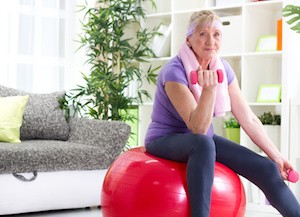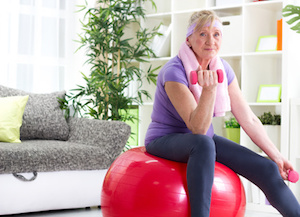
No matter how fast or slowly you walk, run, cycle or swim, you will always overtake someone who is doing nothing.
Exercise, be it a 10-minute walk to the shop, or a regular workout at the gym, will always do you good. If you want to get technical about it, exercise will help protect your telomeres, the stretches of DNA on the ends of our chromosomes that get shorter with age and leave cells vulnerable to damage.
Numerous studies show that the more physically active people are during middle age, the healthier their cells stayed as they aged.
It’s important to enjoy exercise so that it can be easily and happily incorporated into your lifestyle, rather than a chore that you may tend to avoid.
Furthermore, focus on functional activities that work for you. With each year, one’s metabolism slows a little, so to maintain muscle mass (which in turns helps keep your metabolism working efficiently), ensure that there is some resistance element to your activity – eg water, body weight or a bicycle.
If you still enjoy running and it is comfortable for you, then by all means continue – but focus on activities that you can perform comfortably and efficiently. ‘No pain, no gain’ is a largely outdated philosophy when it comes to physical activity for the general public. Rather, think of ‘use it or lose it’ as a guide.
Weight-bearing exercises also help you maintain bone density, which generally starts to drop as you age, and for women, once you enter menopause (declining estrogen levels play a role).
Bone is living tissue, and it only keeps itself as strong as it needs to be. If you regularly use your bones, they’ll maintain greater strength to keep up with your activities.
Interestingly, a study in Gerontology found the more powerful your legs are, the better your brain will age. Researchers looked at sets of female twins with an average age of 50 and found that within the pairs, the twin with stronger legs had a brain that aged better (both structurally and functionally) over a 10-year period. The strong legs/strong mind connection isn’t totally understood, but one theory is that when our muscles are put to work, they release neurochemicals that stimulate brain cells, and since leg muscles are among the largest muscles in the body, they may release more. Think of it as giving your brain a lift, as well as your body!









seafarer - 8 years ago
Can anyone help with suggestions to treat severe abdominal bloating.Tablets prescribed by my doctor do’n’t work. I have had Chrohns for some years,probably a contributing factor but the bloating is recent.